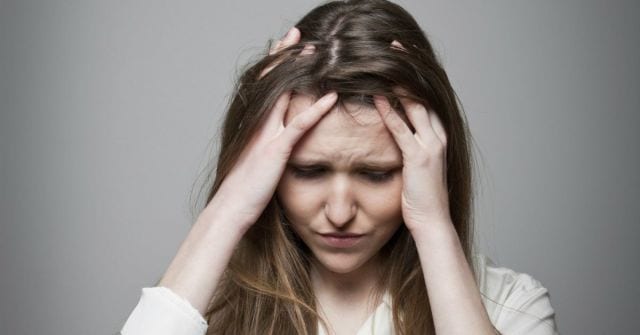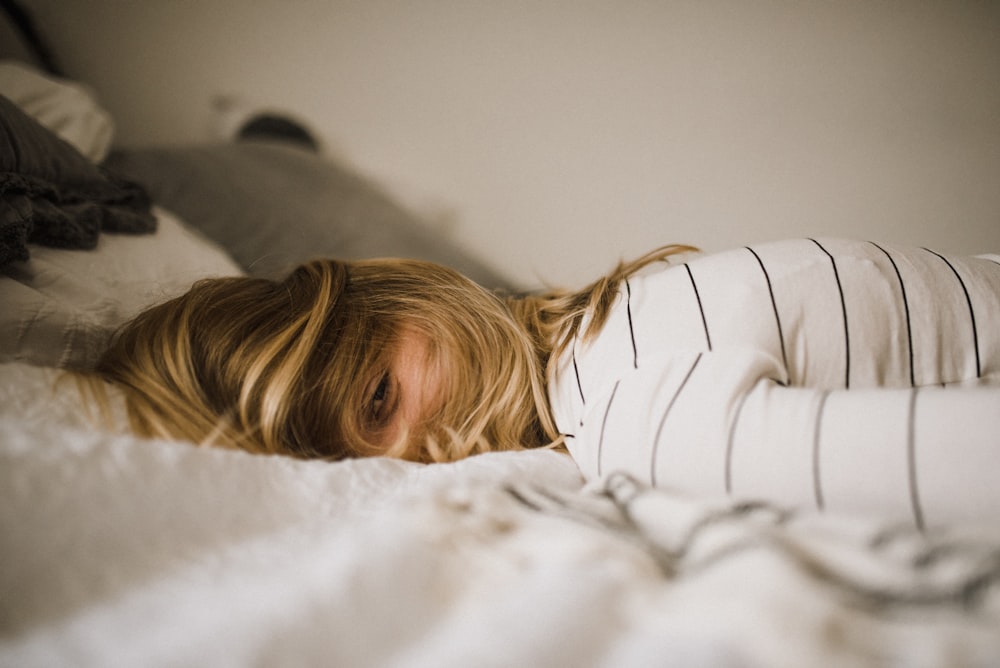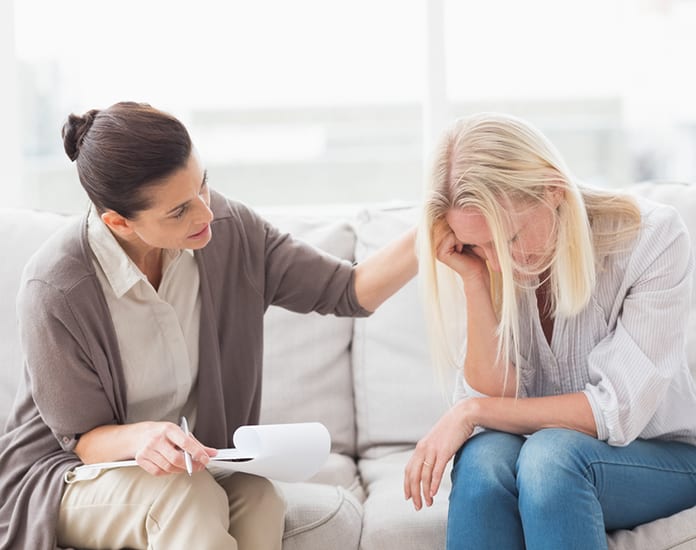
How much do you know about anxiety? Does anxiety cause lack of sleep? For instance, did you know that anxiety disorders are one of the most common mental illnesses in the United States? The National Institute of Mental Health states that there are nearly 40 million adults that suffer from an anxiety disorder each year in the United States alone, and over 6 million American adults have more than one.
Research has also shown that most people who suffer from anxiety disorders, such as generalized anxiety disorder, panic disorder, obsessive-compulsive disorder, and post-traumatic stress disorder experience sleep problems such as insomnia or restless sleep at some point during their illness.
Sleep troubles are one of the most common symptoms of anxiety. When we are anxious, our minds race and we become worried about possible consequences of our actions. This constant worry can cause us to feel as if we are not able or not in control of our own emotions.
When anxious, it can cause a lot of changes in the body that can lead to insomnia in a number of different ways. This article will explore the role of anxiety in insomnia and the ways that anxiety disorder can cause insomnia.
Contents
Does anxiety cause insomnia?
Anxiety can indeed lead to a lack of sleep due to a reciprocal relationship between the two. Just as anxiety can impact sleep, sleep disruptions can intensify anxiety. The connection is rooted in the fact that insufficient sleep raises cortisol levels, contributing to heightened anxiety levels.
This cycle is evident in sleep anxiety, a hallmark of insomnia, where anxious thoughts often prevent falling asleep. The interplay between anxiety and sleep disturbances is a recognized trait of anxiety disorders, as worry and rumination during nighttime can exacerbate insomnia. The resulting anxiety-induced insomnia creates a feedback loop, where sleep deprivation further.
Anxiety can cause insomnia (lack of sleep) and other serious sleep issues due to the alteration of the normal brain chemicals and certain symptoms of anxiety combined making it more difficult to sleep. Some of the symptoms that affect sleep when you have anxiety include persistent worry during the day that often carries over into the night, dread, or apprehension which leads to the inability to relax and fall asleep/ stay asleep through the night ultimately.
The mental hyperarousal from anxiety always leads to sleeplessness. Persistent lack of sleep can also increase the risk for anxiety disorders thus forming a cyclical causal effect on each other. Due to this, anxiety and sleep are in most cases intertwined. Moreover, insomnia affects the recovery from anxiety disorders and also can worsen your anxiety symptoms.
What Is Insomnia?
Insomnia is defined as difficulty falling asleep, staying asleep, or both. It is recognized as one of many symptoms of anxiety disorders, which is why it’s particularly important to understand how sleep affects anxiety in order to treat insomnia. The number of cases involving sleep disturbances related to anxiety disorders has been growing, with new cases being diagnosed each year.
The American Sleep Association describes insomnia as a condition in which a person has one or more of these symptoms for at least a month:
- Problems falling asleep
- Difficulty staying asleep
- Waking up too early
- Waking up often during sleep
- Not feeling rested even after sleeping.
Around 50-70 million Americans suffer from an anxiety disorder each year—with around 30% of those cases being severe enough to be considered anxiety disorders.
Those numbers mean it’s quite possible that you have an anxiety disorder, or know someone who does! The Centers for Disease Control estimates that 43.8 million adults in America will have an anxiety disorder in their lifetime.

The Role of Anxiety in Insomnia
The intricate relationship between anxiety and insomnia underscores their reciprocal influence. Just as anxiety can cast its shadow over sleep, the quality of sleep can conversely impact anxiety levels. This intricate interplay hinges on the effect of sleep deprivation on cortisol production, culminating in heightened anxiety.
A hallmark of insomnia, sleep anxiety, is closely intertwined with this dynamic – individuals grappling with persistent worry often find themselves entangled in ruminative thoughts while in bed, thwarting their ability to initiate sleep. This symbiotic connection has long been recognized, with severe sleep disruptions like insomnia frequently manifesting as a cardinal symptom of anxiety disorders.
The convergence of anxiety symptoms can synergistically exacerbate the struggle to attain rest, leading to the emergence of anxiety-induced insomnia. The vexing cycle perpetuates itself as sleep deprivation begets heightened anxiety, further distorting sleep patterns, and ultimately ensnaring individuals in a self-reinforcing loop of sleep-related challenges.
Symptoms of an Anxiety Disorder and insomnia
There are many symptoms of an anxiety disorder that can cause insomnia. These include restlessness, a sense of impending danger, increased heart rate or breathing, sweating or trembling, trouble concentrating, digestion problems, and sleep problems.
Anxiety disorders encompass a range of distressing symptoms that can significantly impact daily functioning. These may include persistent worry, excessive fear, and an array of physical and psychological manifestations. People with anxiety disorders often experience restlessness, irritability, difficulty concentrating, muscle tension, and a heightened startle response. Additionally, they might avoid certain situations or places due to fear and may also experience physical symptoms like rapid heartbeat, sweating, and trembling.
Insomnia, on the other hand, refers to persistent difficulties in falling asleep, staying asleep, or waking up too early and not being able to fall back asleep. Symptoms of insomnia include trouble falling asleep despite feeling tired, waking up frequently during the night, waking up too early in the morning, and experiencing non-restorative sleep that leaves individuals feeling unrefreshed. People with insomnia often struggle with daytime symptoms like fatigue, difficulty concentrating, mood disturbances, and impaired performance.
The intricate link between anxiety disorders and insomnia becomes apparent as certain symptoms of anxiety can exacerbate sleep difficulties. For instance, the persistent worry and rumination characteristic of anxiety disorders can intrude on bedtime, making it hard to relax and initiate sleep.
Conversely, sleep disturbances caused by insomnia can intensify anxiety symptoms due to the impact of sleep deprivation on hormone levels, such as cortisol, which in turn heightens anxiety. This interplay between the two conditions can create a self-perpetuating cycle, where anxiety fuels insomnia, and disrupted sleep in turn amplifies anxiety, making it crucial to address both aspects when seeking effective treatment.
What do I do if I Have Anxious Thoughts?
What do I do if I have anxious thoughts at night when trying to sleep? Learning to question your thought pattern can help you work through issues that keep you up at night.
Sleeplessness due to anxious thoughts may also be eased by breathing exercises, aromatherapy, exercising during late evening hours, yoga, or meditation.
Mindfulness is another practice that is used in conjunction with many other self-care strategies. This involves being aware of your environment in a nonjudgmental way so that you can respond instead of react. When it comes to addressing anxiety and sleeplessness, mindfulness should be used as part of a well-rounded treatment plan for anxiety disorder.
How To Get Better Sleep
Sleep problems are, unfortunately, a very common symptom of anxiety disorders. If you or someone you know suffers from anxiety, it’s helpful to know that most people can learn to sleep normally again by modifying their behaviors around bedtime.
That may include setting a consistent sleep schedule, eating right (no caffeine in late afternoon/evening hours), ensuring there’s a restful environment conducive to sleeping, limiting daytime naps if possible, exercising regularly (but not too close to bedtime), and limiting stressful events in your life during periods when anxiety is especially high.
Cognitive-behavioral therapy for insomnia is also an effective treatment method for some patients.
If you’re experiencing sleep anxiety due to an anxiety disorder, such as panic disorder or generalized anxiety disorder, there are several steps you can take to address your insomnia. Even if your primary cause for sleeplessness is stress rather than mental health conditions, these tips may still help ease your apprehension at night.

Myths & Facts About Insomnia
How do you know if insomnia is caused by sleep anxiety disorder, or just normal stress, anxiety, stress? For example, if your sleep problems are caused by an anxiety disorder such as post-traumatic stress disorder (PTSD), they may not be helped by napping in a closet during work hours. The key to treating sleep disorders is to identify what is causing them.
Fact: Sleep Problems are Real You may not realize that when you say you have insomnia, you actually mean that you don’t sleep enough—that you’re getting six hours of sleep every night instead of seven or eight.
This fact makes it easy to dismiss your lack of sleep as simply a preference. But your brain requires an adequate amount of sleep each night in order to function properly.
Natural Solutions For Insomnia
While many people turn to sleep medications to treat insomnia, these drugs can have a number of unwanted side effects, including morning grogginess. Instead, explore natural solutions for insomnia that help you achieve a restful night’s sleep without potentially harmful medications.
Mindful meditation, progressive muscle relaxation, regular exercise or hot baths can help induce drowsiness. The key is to practice these strategies just before bedtime so your body associates them with sleep time.
How The Quality Of Your Sleep Affects Your Mental Health
A good night’s sleep is essential for maintaining mental health and emotional well-being. If you’re suffering from anxiety and/or depression, a night of poor or inadequate sleep can cause irritability and stress, which then exacerbates these conditions.
Several other mental disorders that affect both children and adults are also related to changes in sleeping patterns, including schizophrenia, bipolar disorder, ADHD, dementia, and personality disorders (antisocial personality disorder).
But understanding how lack of sleep may cause mood disorders like anxiety or depression is complex. Depression has been linked to decreased neurogenesis (neuron creation) in the hippocampus (the area of your brain responsible for learning new things and storing memories), but new research shows that sleeping too much could also lead to depression by interfering with sleep cycles.
How do you treat anxiety-induced insomnia?
These recommendations are key components of cognitive-behavioral therapy for insomnia (CBT-I), a structured approach to treating insomnia that targets both the cognitive and behavioral aspects contributing to sleep difficulties. Additionally, if anxiety is a significant factor, addressing the underlying anxiety through therapy or relaxation techniques can also help alleviate insomnia symptoms. The following are the natural ways to manage anxiety-induced insomnia:
- Establish Consistent Sleep Schedule: Going to bed and waking up at the same time every day helps regulate your body’s internal clock, making it easier to fall asleep and wake up naturally.
- Exposure to Daylight: Natural light exposure during the day helps regulate your circadian rhythm. Spending time outdoors in daylight for about 30 minutes each day can positively impact your sleep patterns.
- Regular Exercise: Engaging in regular physical activity can promote better sleep, but try to avoid vigorous exercise close to bedtime as it may be stimulating.
- Limit Naps: Short naps of less than an hour can be refreshing, but avoiding napping after 3 p.m. prevents interfering with your nighttime sleep.
- Relaxation Activities: Engaging in calming activities before bed, such as meditation, deep breathing, or listening to soothing music, can help you unwind and ease into sleep.
- Caffeine Moderation: Avoid consuming caffeine in the late afternoon or evening, as it’s a stimulant that can disrupt your sleep cycle.
- Bedtime Based on Sleepiness: Only go to bed when you genuinely feel sleepy to avoid lying awake and building an association between your bed and wakefulness.
There are many things that you can do to help treat anxiety-induced insomnia. Sleep aids, such as Ambien, Zolpidem, or Lunesta may be prescribed to you by your doctor. Benzodiazepines are a class of drugs that produce a sedative effect when they enter your bloodstream.
The most common benzo used for sleep issues is called lorazepam (also known as Ativan). Antidepressants have also been linked to treating both anxiety and sleep issues as well.

Does melatonin help with anxiety?
Melatonin is a hormone produced in the brain that helps with sleep in both children and adults. Melatonin is also said to have antidepressant effects which can help with anxiety.
It’s important to note, though, that the effect of melatonin on insomnia is not as well studied as other factors like depression or anxiety. In general, melatonin will help people with anxiety disorders by improving the insomnia symptoms of their condition.
For example, high doses of melatonin have been shown to improve symptoms of generalized anxiety disorder in some patients who are also off antidepressants and benzodiazepines (drugs used for short-term relief from anxiety).
If you are interested in trying out natural remedies for your insomnia, I would recommend a supplement containing 5mg of melatonin per dose, along with additional supplements and herbs such as passionflower and lemon balm for reducing stress and calming the nervous system.
How do you fall asleep with anxiety?
If your inability to sleep is related to anxiety, there are steps you can take to help yourself relax. These measures include: limiting activities that revolve around looking at screens (e.g., digital devices, TVs, etc.), incorporating relaxation exercises into your evening routine, and increasing exercise.
The key to falling asleep with anxiety is reducing your stress levels. A hot bath or deep breathing can help, as can simply reading a book or listening to music. You’ll be able to get some rest if you learn how to fall asleep with anxiety. Just make sure that you take your time winding down—try not to force yourself into bed before you’re ready, even if it means spending a little extra time on Netflix first.
While it’s true that many people with insomnia also have an anxiety disorder, it’s not true that all people with anxiety disorders also have insomnia. In fact, according to one study in which data was analyzed from a national survey conducted between 2005-2007 by researchers at CDC’s National Center for Health Statistics, less than 10 percent of individuals who had an anxiety disorder reported having sleep problems such as trouble falling asleep or staying asleep throughout both weekdays and weekends.
Does sleep help anxiety?
When you’re anxious, your mind will race and you’ll start to worry about possible consequences of your actions. This constant stress and tension will build up in your life. You may not even be aware of it, but anxiety is one of the biggest factors that cause insomnia.
When we are anxious, our minds tend to race and we become worried about the consequences of our actions. This constant stress and tension build up in our lives. We might not even be aware of it, but anxiety is one of the main causes for insomnia. Insomnia can have a lot of different triggers, so a person’s experience with it will vary depending on their specific needs and circumstances
So there are many reasons why people might have insomnia including genetics, lifestyle choices, medical conditions or disabilities, depression or other mental health issues, physical pain or discomfort, as well as other factors like sleep apnea or restless leg syndrome
In order to get a better understanding of what causes someone to have insomnia issues we need to look at their unique situation so that way they can come up with an appropriate treatment plan that will help them manage their issues best. That’s why while there are a number of different reasons someone might struggle with sleep problems–anxiety is one factor that can make it much more difficult for some people to get a good night’s rest when they need it most!
What is nighttime anxiety?
Nighttime anxiety is a mental health condition in which an individual experiences high levels of worry and apprehension during the nighttime hours. Individuals with nighttime anxiety might experience racing thoughts and sudden bursts of fear that can keep them from getting a good night’s sleep.
This will result in difficulty falling asleep, waking up frequently throughout the night, and waking up too early in the morning. It is not uncommon for those with nighttime anxiety to have a heightened sense of alertness during nighttime hours.
Nighttime anxiety often results in daytime symptoms such as fatigue, irritability, restlessness, and headache. Similar to insomnia, people suffering from nighttime anxiety may also experience difficulties with concentration or memory.
Conclusion
Insomnia is a common struggle for many people, especially those who suffer from an anxiety disorder. With the right amount of research, you can learn how to combat the effects of anxiety and insomnia.
For example, find ways to keep your mind busy or try some relaxing activities before bedtime. All in all, by learning how to manage your anxiety and how it affects your sleep cycle, you’ll be able to get the more restful sleep that will help you feel less anxious throughout the day.
FAQs
What is the relationship between anxiety and insomnia?
Insomnia is a condition in which an individual has trouble falling asleep or staying asleep. Anxiety can cause insomnia because when we are anxious our minds race, and we might be worried about things that could happen in the future.
How does anxiety disorder create sleep problems?
Anxiety disorder can cause insomnia because the mind may become overactive with worry or panic about the potential dangers of the future. This means that you may find it difficult to fall asleep at night and may have difficulty sleeping throughout the night.
Is there a link between depression and insomnia?
The link between depression and insomnia is not as clear-cut as with anxiety, but it does exist to some degree. With anxiety, there are physical changes in the body that can lead to altered sleep patterns, whereas with depression this isn’t necessarily true. Sleep deprivation is just one of many symptoms of depression, however, so it is possible that they do share a relationship in some cases.
What are some ways to decrease your stress levels?
There are many different ways to reduce your stress levels if you suffer from anxiety disorders including meditation, exercise, practicing mindfulness techniques, yoga, getting enough sleep each night, reducing alcohol intake, or smoking cigarettes – all of these methods should help alleviate your stress levels and allow you to get better quality sleep.
4 Citations:
https://www.webmd.com/sleep-disorders/anxiety-vs-insomnia
https://www.healthline.com/health/anxiety-insomnia
https://www.health.com/condition/sleep/anxiety-insomnia-sleep-strategies
https://adaa.org/understanding-anxiety/related-illnesses/sleep-disorders
